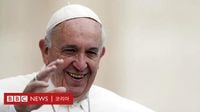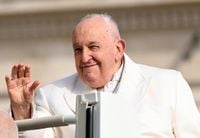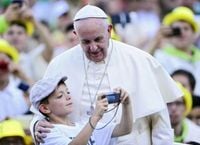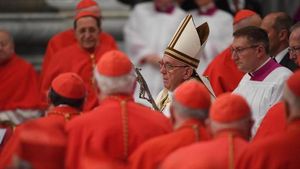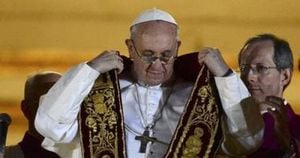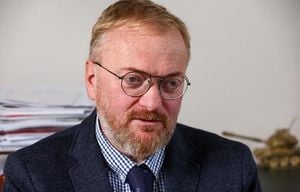Pope Francis, the first Latin American pope and a prominent figure in the Catholic Church, passed away on April 21, 2025, at the age of 88. The Vatican announced his death early in the morning, with Cardinal Kevin Farrell stating that the Pope returned to the "Father's house" at 7:35 AM local time. This news comes just a day after he delivered a heartfelt "Happy Easter" message to thousands of believers gathered in St. Peter's Square.
Born Jorge Mario Bergoglio in Argentina, Pope Francis had recently been hospitalized for a lung infection, spending five weeks in treatment before being discharged. His health had been a concern for some time, as he suffered from various issues throughout his life, including a significant surgery at the age of 21 that removed part of his lung, making him more susceptible to infections.
In the wake of his passing, global leaders have expressed their condolences. French President Emmanuel Macron remarked that Pope Francis had "always been on the side of the most vulnerable," while Dutch Prime Minister Deep Schoff referred to him as "a people's person in every way." These sentiments reflect the Pope's commitment to advocating for the marginalized and his dedication to social justice.
Following the Pope's death, the College of Cardinals will convene to elect a new leader for the Catholic Church. Currently, there are 252 Catholic cardinals, with 138 holding the right to vote in the upcoming papal election. This conclave, known for its secrecy, will be tasked with choosing the successor to Pope Francis, who led 1.4 billion Catholics worldwide since his election in 2013.
Pope Francis was known for his humble lifestyle, often breaking with traditional papal customs. He famously wore a simple cassock, opted for a steel cross instead of a gold one, and chose to live in the Santa Marta guesthouse rather than the luxurious papal apartments. His approachability and commitment to simplicity resonated with many, earning him admiration across the globe.
Throughout his papacy, he faced health challenges, including a severe lung infection that required hospitalization in February 2025. Despite his declining health, he remained active, even visiting prisons and meeting with world leaders, including U.S. Vice President JD Vance, shortly before Easter. His last public appearance was on April 20, when he addressed the faithful during Easter celebrations, calling for peace and compassion in a world often marred by conflict.
In his final Easter message, titled "Urbi et Orbi" (to the city and the world), Pope Francis emphasized the importance of life and urged those involved in conflicts to cease hostilities and extend help to those in need. He stated, "The Lord's resurrection is a celebration of life. God created us for life, and I pray that the human community will rise again. I ask those involved in war to stop using weapons and look to a peaceful future, and extend a helping hand to those in need." His commitment to peace and dialogue was a hallmark of his papacy, and he consistently advocated for the most vulnerable throughout his life.
Pope Francis's funeral is expected to be simple, in line with his wishes for a dignified yet modest ceremony. He had previously expressed a desire for a funeral that reflects the simplicity of a priest's ceremony, stating, "Even with dignity, I want a simplified ceremony like that of a priest." This desire for humility echoes his lifelong commitment to living out the values he preached.
As the Catholic Church prepares for a new chapter, it reflects on the legacy of Pope Francis, who, during his time as pope, sought to reform the Church's stance on various social issues. He was known for his progressive views, advocating for the inclusion of marginalized groups and pushing for reforms that made the Church more open to dialogue with the modern world. His efforts to bless same-sex couples, for instance, stirred controversy among conservative factions within the Church, particularly in regions where such issues are sensitive.
Moreover, Pope Francis played a crucial role in international diplomacy, contributing to the normalization of relations between the United States and Cuba, and advocating for peace in conflict zones such as Iraq and Myanmar. His visits to these regions were not merely symbolic; they were part of his broader mission to promote peace and reconciliation in a world often divided by strife.
In addition to his diplomatic efforts, Pope Francis was vocal about pressing global issues, including climate change and economic inequality. He consistently called for action against environmental degradation and criticized consumerism, emphasizing the need for a more sustainable approach to living. His encyclicals, particularly "Laudato Si'", addressed the urgent need for environmental stewardship and social responsibility.
As the world mourns the loss of Pope Francis, many will remember him not only for his role as a spiritual leader but also for his profound impact on social justice, peace advocacy, and the modernization of the Catholic Church. His passing marks the end of an era, and the next pope will undoubtedly face the challenge of continuing his legacy while addressing the evolving needs of the global Catholic community.
Pope Francis's dedication to serving the Church and advocating for the marginalized will be remembered as a defining aspect of his papacy. His life was a testament to the values of compassion, humility, and service, and his influence will continue to resonate within the Church and beyond.
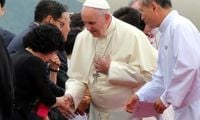
![[속보] 프란치스코 교황 선종](https://thumbor.evrimagaci.org/Pq3sM-HuXnpaEPPyjxmqqO2-WYw=/200x0/tpg%2Fsources%2F5d8bde80-f627-458e-862a-9d99fb1a5f9c.jpeg)
